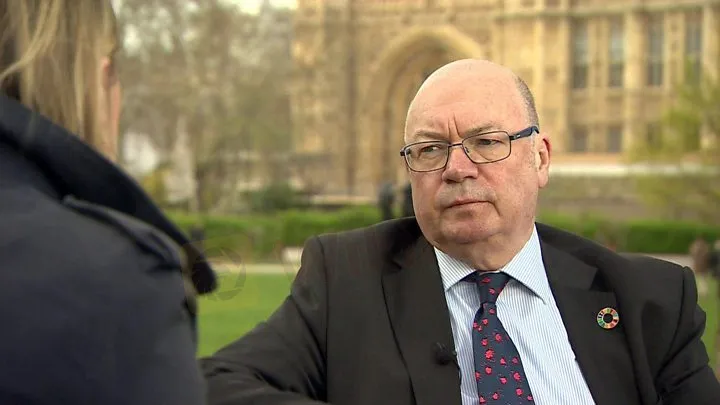简体中文
繁體中文
English
Pусский
日本語
ภาษาไทย
Tiếng Việt
Bahasa Indonesia
Español
हिन्दी
Filippiiniläinen
Français
Deutsch
Português
Türkçe
한국어
العربية
Brexit: MPs set out plan to consider alternatives to PM's deal
Abstract:Image copyrightHOC MPs have set out details of their plan to consider other Brexit options, as There
Image copyrightHOC
MPs have set out details of their plan to consider other Brexit options, as Theresa May was warned more ministers could quit unless she changed course.
The Commons will begin voting on alternatives on Wednesday, in a process likely to continue into next week.
MPs will fill out a series of ballots testing support for different ideas.
Ex-minister Alistair Burt said the PM must recognise a “different answer” was now needed but ex-Brexit secretary David Davis warned of impending chaos.
MPs took the unprecedented step of voting to seize control of the parliamentary timetable on Monday, in an attempt to end the deadlock over the terms of the UK's exit.
Live page: Reaction as MPs take control
Adler: No EU joy over new Brexit votes
What are indicative votes?
MPs back votes on Brexit alternatives
How the indicative vote process will work
It will be up to Commons Speaker John Bercow to decide what propositions are voted on, although they are likely to include proposals for a “softer Brexit”, such as a customs union with the EU, a simple free trade agreement with the EU and another referendum.
According to a copy of a business motion released by Labour's Hilary Benn, there will be about five hours of debate on different options.
Skip Twitter post by @hilarybennmp
Indicative Votes: Text of the Business of the House Motion for tomorrow. pic.twitter.com/451tDmKdU7
— Hilary Benn (@hilarybennmp) March 26, 2019
Report
End of Twitter post by @hilarybennmp
Voting will take place at about 19.00 GMT, with the results announced by Mr Bercow later that evening.
The process is likely to continue on Monday as MPs seek to winnow down options which could command majority support in Parliament.
Ahead of the unprecedented series of votes, Mrs May has been warned that other ministers could quit unless she listens to the concerns of MPs who are prepared to stop a no-deal exit at all costs.

Media playback is unsupported on your device
Media captionBurt: “We will not go down the route of no-deal.”
Mr Burt, one of three ministers who quit on Monday to back the so-called “indicative votes” plan, said he still backed the prime minister's deal but she had a duty to look at other options.
“My advice to the prime minister would be to recognise that her duty now is perhaps to find a different answer than the one she has tried to find,” he told the BBC's Laura Kuenssberg.
But former Brexit secretary David Davis said the PM's deal was better than the alternatives and had a “decent chance” of getting through Parliament if put to the vote again.
“It's not a good deal but the alternative is a complete cascade of chaos,” he said. “You are seeing proposals being put up which are all worse than hers.”
The PM has signalled she will try to bring her deal, which has been heavily rejected twice, back to the Commons for a third time later this week but only if she believes she can win.
Some Tory Brexiteers have now suggested they could support it in order to prevent the risk of a long delay to Brexit.
But the Democratic Unionists, whose 10 MPs prop up Mrs May's government, urged Tory MPs to “stand firm” in their opposition unless there were “significant changes”.
What's happening this week?
Image copyrightUK Parliament/Mark Duffy
Tuesday:Theresa May met her cabinet. Tuesday had been considered as a possible day for the so-called third meaningful vote on Mrs May's withdrawal deal. But, on Monday, the PM said the deal did not have enough support to get through the Commons “as things stand”.
Wednesday:This is when indicative votes will be held - we don't know yet whether MPs will be free to vote how they want or be directed along party lines. The prime minister is also due to address the 1922 Committee of Conservative backbenchers. MPs will also vote on changing the Brexit date in UK law from 29 March.
Thursday:A possible opportunity for meaningful vote three. The prime minister may hope that Brexiteers will finally decide to throw their weight behind her deal.
Friday:This is written into law as the day the UK leaves the EU, although the PM has said she will pass legislation this week to remove it. The earliest Brexit is likely to happen is now 12 April.
Read more on the week ahead in Parliament
Disclaimer:
The views in this article only represent the author's personal views, and do not constitute investment advice on this platform. This platform does not guarantee the accuracy, completeness and timeliness of the information in the article, and will not be liable for any loss caused by the use of or reliance on the information in the article.
WikiFX Broker
Latest News
SQUARED FINANCIAL: Your Friend or Foe?
Big News! UK 30-Year Bond Yields Soar to 25-Year High!
High-Potential Investments: Top 10 Stocks to Watch in 2025
Why Is Nvidia Making Headlines Everywhere Today?
Discover How Your Trading Personality Shapes Success
US Dollar Insights: Key FX Trends You Need to Know
FINRA Charges UBS $1.1 Million for a Decade of False Trade Confirmations
BI Apprehends Japanese Scam Leader in Manila
Bitcoin in 2025: The Opportunities and Challenges Ahead
Join the Event & Level Up Your Forex Journey
Currency Calculator






